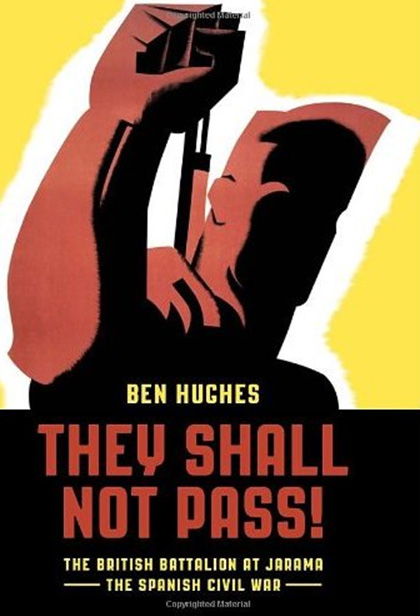They Shall Not Pass: The British Battalion at Jarama
Review

They Shall Not Pass: The British Battalion at Jarama, Ben Hughes, Osprey, 2011, 272p, ISBN 978-1-84908-549-6, £20-00.
In one respect this is largely an account of a four-day engagement in the early days of the Spanish Civil War and which involved British volunteers from the International Brigade. Ben Hughes brings alive the experience of the volunteers in the specific Battle of Jarama in February 1937.
However it is much more than just an account of a battle. A J P Taylor believed that the Battle of Jarama was the turning point in the battle against fascism because he felt that, although the anti-fascist forces were defeated, this was the first moment, rather than even the Battle of Britain, when the tide of fascism met the first signs of any significant opposition.
It was also a theatre of war where German aircraft were in active support of Franco's Nationalists and supplies were arriving from Mussolini's Italy. By contrast the volunteers who arrived to join the International Brigade did so against the wishes of the British Government which was at the forefront of the international Non-intervention posture that revealed itself in the policy of Appeasement. The result was that when members of the International Brigade needed to be repatriated, sooner or later, after Jarama, the British Government was most unhelpful in enabling their return.
This book also has two other particularly interesting features. Ben Hughes has researched the background of many of the more prominent volunteers who arrived in the International Brigade from the British Isles. There were adventurers, of course, but there were also veterans from the Great War, trades unionists, socialists and communists, and even former IRA members. This unlikely coalition of activists must have caused the British Government to reflect on what was drawing this disparate band of men together, at a time when foreign policy assumed that communism was a greater threat than fascism. After his description and analysis of the battle, Ben Hughes goes on to examine very interestingly what happened to some of the members of the International Brigade, both in the Second World War and until quite recent times.
This is a very thoroughly researched and helpful piece of research. Anyone who previously had a slight understanding of what was happening in Spain in the late 1930s will find this a very readable explanation of a much wider context.

